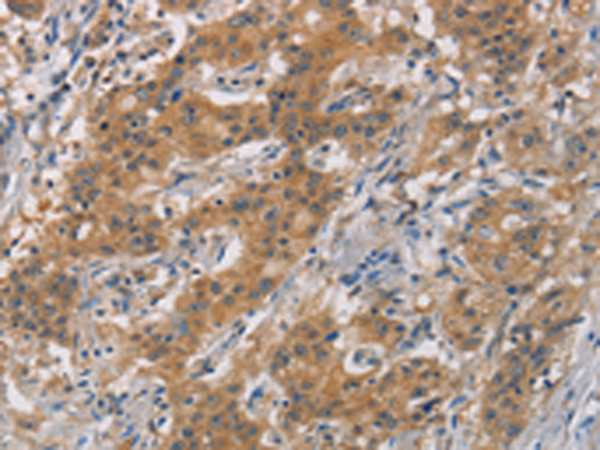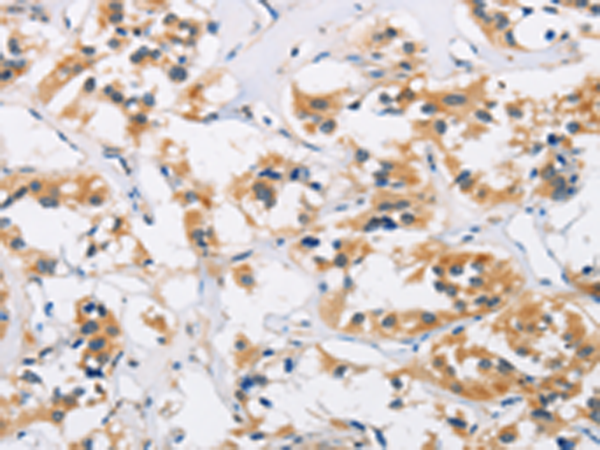


| WB | 咨询技术 | Human,Mouse,Rat |
| IF | 咨询技术 | Human,Mouse,Rat |
| IHC | 1/25-1/100 | Human,Mouse,Rat |
| ICC | 技术咨询 | Human,Mouse,Rat |
| FCM | 咨询技术 | Human,Mouse,Rat |
| Elisa | 1/1000-1/2000 | Human,Mouse,Rat |
| Aliases | AXIL; ODCRCS |
| WB Predicted band size | 94 kDa |
| Host/Isotype | Rabbit IgG |
| Antibody Type | Primary antibody |
| Storage | Store at 4°C short term. Aliquot and store at -20°C long term. Avoid freeze/thaw cycles. |
| Species Reactivity | Human, Mouse, Rat |
| Immunogen | Fusion protein of human AXIN2 |
| Formulation | Purified antibody in PBS with 0.05% sodium azide and 50% glycerol. |
+ +
以下是3篇关于AXIN2抗体的参考文献,涵盖其应用及功能研究:
1. **"AXIN2 is a biomarker of progenitor status in normal mammary glands and breast cancer"**
- **作者**: Lindvall C. et al.
- **摘要**: 研究利用AXIN2抗体通过免疫组化分析正常乳腺组织和乳腺癌样本,发现AXIN2可作为乳腺干细胞/祖细胞的标记物,并揭示其在乳腺癌发生中的潜在调控作用。
2. **"Antibody-based detection of AXIN2 reveals functional roles in colorectal cancer progression"**
- **作者**: Lustig B. et al.
- **摘要**: 通过Western blot和免疫荧光技术,验证了AXIN2抗体在结直肠癌细胞系中的特异性,证实AXIN2表达与Wnt/β-catenin通路活性及肿瘤侵袭性相关。
3. **"AXIN2 mutations in hepatocellular carcinomas and their association with β-catenin stabilization"**
- **作者**: Taniguchi K. et al.
- **摘要**: 研究使用AXIN2抗体检测肝细胞癌中AXIN2蛋白表达缺失,发现其突变导致β-catenin异常积累,提示AXIN2作为肿瘤抑制因子的功能。
4. **"A validated monoclonal antibody for the detection of AXIN2 in formalin-fixed paraffin-embedded tissues"**
- **作者**: Kim S. et al.
- **摘要**: 开发并验证了一种适用于石蜡包埋组织的AXIN2单克隆抗体,证明其在多种癌症病理切片中检测AXIN2稳定性和定位的可靠性。
这些研究展示了AXIN2抗体在肿瘤机制研究、干细胞标记鉴定及病理诊断中的应用价值。
AXIN2 (Axis Inhibition Protein 2) is a key regulatory component of the Wnt/β-catenin signaling pathway, which plays a critical role in embryonic development, tissue homeostasis, and cell proliferation. As a negative regulator, AXIN2 forms a destruction complex with other proteins (e.g., APC, GSK3β, and β-catenin) to promote the degradation of β-catenin, thereby inhibiting Wnt target gene transcription. However, Wnt pathway activation triggers AXIN2 upregulation through a negative feedback mechanism, making it both a target and modulator of Wnt signaling. Dysregulation of AXIN2 is implicated in various cancers (e.g., colorectal, hepatocellular carcinoma), fibrotic diseases, and developmental disorders.
AXIN2 antibodies are essential tools for studying its expression, localization, and function in biological and pathological contexts. They are widely used in techniques like Western blotting, immunohistochemistry (IHC), and immunofluorescence (IF) to detect AXIN2 protein levels in tissue samples, cell lines, or 3D organoid models. These antibodies help identify Wnt pathway activity, as elevated AXIN2 often correlates with hyperactive Wnt signaling. Researchers also utilize AXIN2 antibodies to explore its role as a potential biomarker for cancer prognosis, stem cell regulation, or tissue regeneration. Commercial AXIN2 antibodies are typically developed against specific epitopes, with validation across species (human, mouse, rat) and applications. However, variability in antibody specificity and sensitivity requires careful validation using controls like knockout models or siRNA-mediated knockdown to ensure reliability in experimental settings.
×